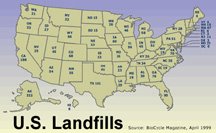Garbage from out of state declines
The Milwaukee Journal Sentinel
MILWAUKEE, WI - The amount of garbage from other states trucked to Wisconsin and dumped in landfills here declined last year, possibly the result of higher gas prices and increased market value for recyclables.
Other states, mostly Illinois and Minnesota, sent a total of 1.9 million tons of their trash to Wisconsin landfills last year, according to a new report compiled by the state Department of Natural Resources.
That was about 229,000 tons less than the 2.1 million tons of out-of-state waste dumped in Wisconsin in 2005, DNR reports show. The all-time high was 2.2 million tons in 2004. In 1990, Wisconsin took in 290,000 tons of waste from other states.
The new DNR statistics come as the Legislature debates proposals to increase what's known as the recycling tipping fee. The fee is one of several assessed on all waste dumped in Wisconsin landfills, and the revenue it generates supports local recycling programs.
Some advocates of raising the tipping fee say it would discourage out-of-state waste.
The state budget bill submitted by Gov. Jim Doyle proposed raising the fee from the current $3 a ton to $6. Senate Democrats approved an increase to $10 a ton in the budget bill that now goes to the Republican-controlled Assembly.
Suzanne Bangert, director of the DNR's Bureau of Waste Management, which compiles annual landfill statistics, said the decline last year in out-of-state waste could be a result of higher transportation costs for waste haulers driven by higher fuel prices.
"Given higher gas prices, companies will be very carefully looking at their costs and assessing whether to stay closer to the source of the waste."
She also noted that higher prices being paid now for recyclable materials, including scrap metal, paper, plastics and aluminum, could be working to keep more of those materials from being trashed.
"If there's value in those materials, they are less likely to be put in landfills," Bangert said.
But Lynn Morgan, a spokeswoman for Waste Management of Wisconsin Inc., the state's largest waste hauler and landfill operator, said the decline in out-of-state waste sent to Wisconsin last year likely reflects the normal annual fluctuations of the waste hauling business.
"It's not unusual to have shifts in tonnage for any number of reasons."
However, Morgan said, increasing transportation costs is causing out-of-state companies and municipalities that contract with waste haulers to look for closer landfills to dispose of their waste.
The majority of garbage shipped to Wisconsin from Illinois is dumped at Waste Management's Pheasant Run landfill in Kenosha. Last year the amount of Illinois waste dumped there declined by about 133,000 tons.
Overall, the amount of Illinois trash sent to Wisconsin declined by 188,000 tons.
The Illinois tonnage sent to the Mallard Ridge landfill in Walworth County more than quadrupled last year, increasing to about 210,000 tons from 51,000 tons in 2005, according to the DNR report.
The amount of garbage from Minnesota sent to Wisconsin declined from 2005 by about 46,000 tons last year to total about 683,000 tons, the DNR reported.
Sen. Robert Jauch (D-Poplar), an advocate of the $10 tipping fee, said Wisconsin continues to be a magnet for out-of-state waste because of its low tipping fee compared with neighboring states.
"Wisconsin's tipping fee is a blue light special for other states to ship waste here rather than develop more thoughtful recycling programs or build new landfills in their states," he said.
Morgan said raising the tipping fee would impose additional costs on Wisconsin residents and companies because it's charged on all waste landfilled in Wisconsin, including garbage generated here, and it likely would not work to deter out-of-state waste.
But Charlene Lemoine, who works on waste issues for the Waukesha County Environmental Action League, said Wisconsin's low tipping fee combined with tight restrictions in neighboring states on the siting and size of landfills has created a situation that Wisconsin landfill operators are capitalizing on.
"For these big companies that run landfills and haul waste, it's all about volume because bringing in hundreds of thousands of tons of garbage from other states brings in more money than just thousands of tons."













